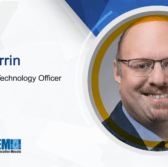Artificial intelligence and machine learning are not meant to replace humans, but to augment the work they do. As organizations deal with increasing amounts of data and workforce issues persist, AI tools and technologies are becoming less of an option and more of a necessity.

Executive Mosaic spoke with Tim Boltz, director of the healthcare business at Carahsoft, to learn more about the AI demand signals coming from the federal landscape and better understand how AI will work in tandem with other emerging technologies and concepts to support a myriad of missions in the public sector. Read below for Boltz’s full Executive Spotlight interview.
Tell me about the current state of the artificial intelligence market. Where are you seeing new opportunities in AI and where do you think the market is heading?
To paint a picture of the opportunity for AI in the marketplace, I think it is worth noting how nascent it is. It is like the early days of the internet. We did not know its impact back then but look at it now — everyone uses it daily, transforming how we live. Cloud computing followed a similar path, changing how we consume technology. Now we’re on the cusp of a monumental inflection point with AI as its infinite potential will impact every aspect of our lives.
However, just like any powerful tool, AI can be used for good and for bad. On one hand, it can do great things. In healthcare, AI and machine learning can analyze vast amounts of data to find patterns. This can accelerate drug development and improve cancer screening, potentially saving lives through early detection.
On the other hand, there are potential dangers. Imagine rogue actors using AI to create ransomware or launch denial-of-service attacks. We can already buy ransomware attacks on the dark web for as little as $25.
AI/ML is immensely powerful, and we are in the infancy of understanding how it will be used. We need to come together as a community to regulate AI and establish standards so that we can apply it across verticals like healthcare, cybersecurity, defense, education and more.
In which applications are you seeing the highest demand for AI/ML from your federal customers, and can you explain what’s driving that demand?
From an application perspective, AI and ML require large datasets. This makes them incredibly valuable for all federal agencies, which inherently deal with vast amounts of data.
NASA, for example, generates massive amounts of data in their quest to expand humanity’s footprint in the solar system and beyond. AI and ML are crucial for analyzing this data, finding patterns and drawing conclusions.
The impact of AI and ML extends far beyond outer space, reaching all the way to healthcare. Here, they can play a critical role in reducing costs and increasing efficacy. AI can analyze health data to identify patterns linked to patient recovery. For instance, AI could flag potential chronic illness risks and recommend preventative measures. This proactive approach saves money compared to costly emergency room visits and unnecessary treatments.
The cost-saving benefits extend beyond healthcare. AI could be used to streamline insurance processes, reduce Veterans Affairs and Defense Health Agency expenses by providing targeted care at home or simplify tax filing through intelligent analysis of W-2s and other documents.
It is not just about saving money, though. AI can also improve human well-being in government services. Chatbots can check in on patients after doctor visits, offering support and reminders for medication adherence and exercise routines. This frees up doctors’ time to focus on complex cases and mental health consultations.
These are just a few examples of how AI and ML can revolutionize the federal government. With 51 percent of the public sector workforce nearing retirement age, it is more important than ever to find ways to do more with less. AI and ML are powerful tools to bridge this gap and improve the efficiency and effectiveness of government services.
That said, I believe it is important to recognize that AI is not going to replace humans. It will not take away jobs or replace professions like physicians or generals in the Army. AI is not designed to alter the command-and-control structure; rather, it serves as a tool to assist in completing missions more efficiently, effectively and at a lower cost. Therefore, I think the approach should be one of acceptance and adaptation to AI.
Resisting AI is not the solution. There will be those who embrace it and those who will not. Those who utilize AI are likely to outperform those who do not. We should embrace and understand these tools. It is crucial for us to come together as a community to establish best practices for using and regulating this technology.
In addition to AI, which emerging technologies do you anticipate will have the greatest impact on the federal landscape in the next few years?
Data security is crucial. AI/ML relies on data to draw patterns and correlations. If your data is not good, you will not achieve accurate correlations or analyses. Therefore, cybersecurity and protecting your data are incredibly important. Quantum encryption plays a role here and is likely to be essential. With the advent of quantum computing revolutionizing data computation speed, essential for AI, ML and other large-scale data processing needs, we must ensure data protection.
In terms of defense, technology’s constant availability is a big advantage. AI can constantly monitor our networks and critical infrastructure. However, this leads to a potential scenario where AI might be involved in warfighting, perhaps in mitigating cyber attacks. This raises questions about the comparative efficiency of our AI versus theirs, with cyber battles potentially unfolding in nanoseconds.
This situation is fascinating, given the current inflection point. Like many innovations, the full capacity and potential of AI may only become clear during implementation. Similar to how the internet created unforeseen issues, AI might introduce challenges we have not anticipated. But I believe cybersecurity will be paramount in our use of AI, just as data will be crucial for effective AI utilization.
Based on what we’ve discussed thus far, where are you seeing opportunities for expansion in Carahsoft’s portfolio? What new capabilities or markets are you eyeing?
Carahsoft is creating a community within the public sector. Public sector, while a broad term, can be better described as highly regulated industries, including federal, state and local education, finance, healthcare as well as critical infrastructure, such as pipelines and municipalities. All these verticals share similar use cases where regulation and oversight are paramount to success in supporting constituents or customers.
To support these highly regulated verticals, first we examine the technologies essential for their success. We focus on areas like AI, cybersecurity, cloud computing, quantum computing, quantum encryption, document management and citizen engagement.
We even established a drones vertical. Public sector entities use drones for public safety and critical infrastructure, such as inspecting power lines and removing debris. For example, flying a drone to clean trash off power lines is a real-world application that reduces costs and contributes to lower electric bills compared to employing a truck to navigate rough terrain.
After identifying emerging technologies and verticals, we invest heavily in becoming experts in these cutting-edge technologies so that we can educate our customers about available technology and guide them on how to use it for maximum impact. This process includes addressing the long tail of considerations such as policy, regulation and standardizing terms for the industry.
Through this approach, and by keeping the customer’s mission at the core, we are expanding our portfolio and expertise, aligning with our commitment to better meet the customer’s mission.





